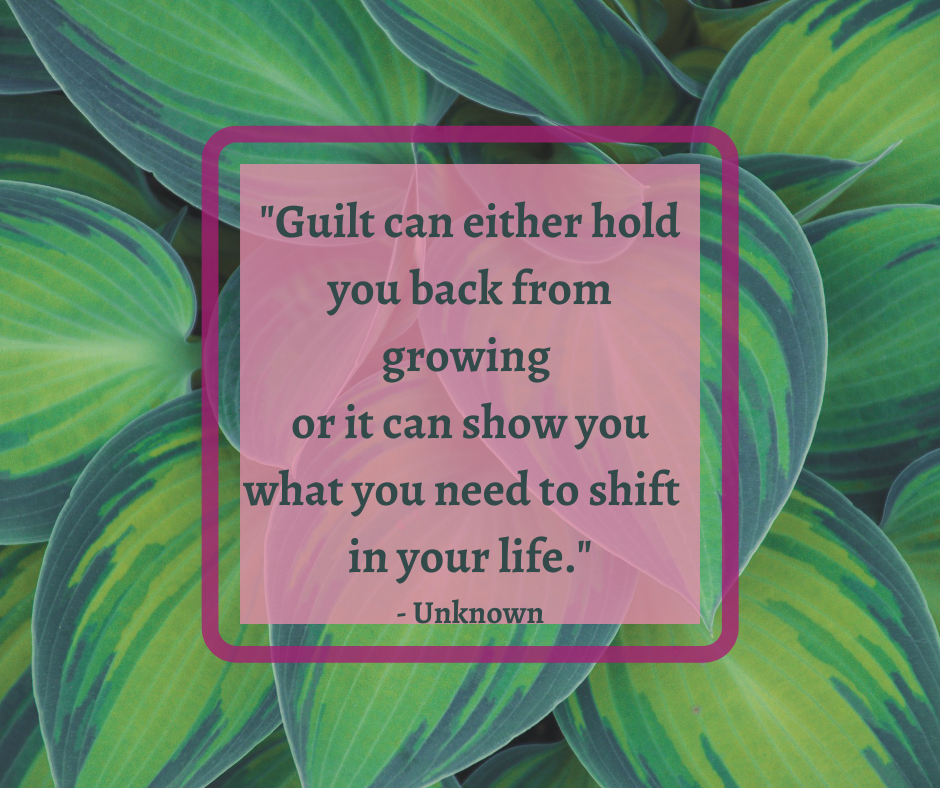Choose to be accountable instead of feeling guilt, choose to feel grateful instead of resentful: and you’ll feel a lot better.
Ok: I can almost hear you say… ah… “That mambo-Jambo of toxic positivity”… It isn’t. And it works.
Nobody can escape the “so-called” negative emotions: we’re human. We feel them. The meaning we give to situations will strongly be attached to an emotion.
Unless you are addicted to feeling bad: you’ll want to be able to process those emotions in a way that builds up your self-confidence and self-esteem. Right?
You’ll want to transform sh*t into gold.
Of course that if you have traits of a psychopath: you won’t even know what it means to feel guilt - I don’t think that’s your case - and you wouldn’t relate to this.
Of course some situations are very hard to cope with, and you might need extra (professional) support on them.
But in many daily situations: you can. You can make this metamorphosis on the meaning you give to some situations, and then change the emotions attached to them.
It really is up to you. Let's start with "accountable" or "guilt".
For Guilt
For (feeling) guilt is a good sign: means you’re not a psychopath and you do have a moral code. Regardless of whether that moral code is being acknowledged or not. Feeling guilt means, that that moral code was over-crossed, overlooked.
And having a moral code is good: sets your inner boundaries. And your inner boundaries will prevent invasive people (toxic, narcissists, manipulative) to take charge of your being/decisions/actions. Boundaries have this internal function. And external too.
What you perceive as wrong is the act that preceded: intentionally or not.
An act that could be of your responsibility or imputed liability (for example, a child that feels guilt for something that was not the child’s fault - sexual molesters of children often use this wicked tactic to manipulate children psychologically and turn the molested child into an accomplice).
These cases of wicked manipulation, authentic killing lies, are not the issue here – therapy would be seriously advised in these cases.
There’s also the survivor's guilt when someone is involved in a tragedy or disaster and, they carry the guilt that might develop into chronic guilt, if not tretead or have therapist counseling.
Here we’re talking about a grown-up person, feeling guilty of something that feels responsible for, because the consequences have caused damage to some situation or person.
Guilt Is A Learned Feeling
Guilt is a learned feeling, a conditioned emotion. Conditioned by family codes, cultural and social codes, religious codes.
When you are a child: you are conditioned.
When you grow up, you’re supposed to define your own moral code. Which will be a mix of what you were conditioned to and what you’ve learned from your own experience and your belief system.
Guilt becomes an issue when it becomes chronic.
If, for example, the upbringing parents always made a child feel like nothing they would do was ever good enough, and that leads to a guilt complex: the person develops constant feelings of not being good enough.
Chronic Guilt
People who struggle with a chronic feeling of guilt are most likely to see their mental health compromised with:
- Depression
- Anxiety
- Obsessive-compulsive disorder (OCD)
Put simply: guilt is a very heavy burden to carry.
So don’t let it drown you: do something.
Something must be done.
To turn sh*t into gold.

Cases of chronic guilt are obviously recommended to take that difficult step and use the services of a therapist, that will guide into strategies to cope with it.
Other cases? …
As the quote sums it: try to understand what changes you need to shift in your life.
That means you have to be accountable.
Transform Guilt Into Being Accountable
To be accountable or take personal accountability for a situation that you are involved in, basically means that you take ownership.
Instead of just sticking for the guilt: you take ownership.
Have some reflection over yourself, learn from the situation that is causing feelings of guilt, and ask yourself:
- What could you’ve done more or better?
- Is there something you can do to mend a situation?
- What was the trigger of that situation that made you act/behave/decide for that what caused damage?
- What characteristics of your personality can you improve on, so you don’t make the same mistake, in the future.
In sum: take your focus out of the problem (guilt) and put focus on the solution.
What you’re saying to yourself is: from this moment on, I take charge for what happens next, I take responsibility for what comes next, no matter the outcome is good or bad.
And do your best to make things right.
You’re no longer a victim of the acts (regardless of if they were your fault or not): from that point, the leadership of that ship is yours.
Feeling Resentful
Resentment is a feeling that a person gets when perceives that has been suffering injustice.
Life is really unfair sometimes.
People are put up to deal with authentic horror scenes, and the feeling of impotence in some situations is extremely traumatizing.
Resentment is more than natural, understandable, and fair to occur.
When Being Resentful Is Intoxicating
Resentment is more than natural, understandable, and fair to occur.
For example, people who suffer assault, abuse – physical or mental, the death of a relative.
These types of resentment can intoxicate a person and they might express it through rage, anger, and eventually, in some cases evolve into hatred – which gives them a false sense of power.
It’s not a healthy way of living – carrying all that toxic energy. Rage, anger, and hatred when directed towards a target, might hurt your “enemy”.
But before that: it hurts you.
And then comes consequences of all that rage anger and hatred: and it hurts you again.
And if you keep on feeding the cycle has no end. You just keep on building up those energies, extract, and build more… In a continuous hell.
Emotions Are Energy: Transform Them
All those emotions are energy: transform them.
A therapist will help you find strategies to cope with those feelings and process them in a less damaging way.
You can have all the money in the world: if you can find peace of mind? You’re living in constant hell. You’re letting an unfortunate moment define you for the rest of your days…
It doesn’t have to be that way.
You have to transform it.
Is not being said is easy: but is doable.
Some people transform that energy in art. Literally turn s*hit into beauty, into gold. we're not all artists (maybe we are a little): but everyone can find his own way to express themselves in a healing way.
Therapy is a start: expressing verbally the resentment, how it makes you feel. Therapy might be a good start.
On the other hand, we see people feeling resentful for shallow reasons. Shallow might be a strong word - because for each and every one of us our feelings have meaning, and only the one who feels it knows where and it hurts.
Even if they are small resentments: they compound.
They might even hide other issues, other old resentments. And people just use the apparent shallow motive as a scapegoat, to express an old resentment.
It’s reasonable to start pealing those emotions: resentment caused by jealousy, envy, or because someone took advantage of you, or someone was promoted instead of, someone is underestimating you, or some shoes, some car, some status, someone’s beauty, someone's glow… Whatever.
The reasons are endless for each one’s resentment.
Resentment is like taking poison an expect for the other person to die."
- Malachy McCourt
Trying to poison yourself?
Consciously? Don’t think so.
Unconsciously? You probably are doing so.
Want to get tolled into resentment?
It does diminish your quality of life, you don’t take as much joy in things: too much energy spent on bitterness, no energy left to enjoy the little or big things, the little or the big wins. And when you win: your think of the ones who envy thinking of how much envy they might be if only they knew – your life revolves around those you envy.
Yes: it is that much of a poison.
What to do?
Instead of thinking of the things you don’t have, and the “the neighbor next door does…”
Put your focus on the good things you already have, it has a pay-off: practice being grateful.
Being Grateful
Research on the past decade suggests that gratitude has a major impact on the body and the mind.
Initially, the research was made upon well-functional young adults and results were positive.
Posteriorly, the research focused on young adult students, who sought psychological counseling. They were clinically reported with low levels of mental health, struggling with depression and anxiety. And the counseling was combined with gratitude exercises.
This is are the benefits that the study suggested, as being a consequence of practicing gratitude exercises:
- Gratitude shifts away inner attention from toxic emotions and makes it harder to ruminate on negative experiences;
- Gratitude helps you even if you don't share it with other people
- Gratitude has lasting effects on your brain: it compounds. And impact of gratitude appear on a brain scan of participants of the research, who showed more activity of the medial prefrontal cortex;
Other studies suggest the link between gratitude and the following:
- Less stress and less pain;
- Healthier relationships;
- Strengthens the immune system;
- Improve the sleep patterns;
- Experience more joy and pleasure;
Practice Being Grateful
Practicing gratitude daily. And doing it daily doesn’t have to be a hard thing.
Basically, if something makes you feel good: you pay a “tribute” and say thank you! to yourself, or to others if feel like it.
The problem is when you are too self-conditioned to think about the negative things, that you barely realize the good things around you.
But you can train your brain by:
- Journaling: the act of writing forces you to seek on memory what you’re grateful for, in the day. It trains you to think of the positive things.
- Write Thank-you notes to others.
- Do the night exercise right before sleep, make it a routine: think about people who were inspiring in your life and…
... Thank them for being a part of your life.
Your people may be the alive ones or the dead ones: thank them. You’ll fall asleep happier.
Just try it and you'll end up saying: I want more of this.
The coffee tastes really good? Give thanks.
The meal is awesome? Give thanks.
You recall a good moment in your life? Give thanks.
The morning sun in your eyes feels good? Give thanks.
And that is between you and your buttons. Nobody has to know: and you benefit anyway.
It doesn’t undo the past bad experiences, doesn’t eliminate the problems in the present.
But surely changes the way you look at them.
And only by that: solutions emerge from your changed brain, new actions, new endeavors, new outcomes will result.
That’s how you train and change your brain for, instead of on endless looping of rumination, you shift your focus on the sunny side of the street.
Getting Better Every Day
Accountable & Grateful Hugs
From Body&Soul
References:
https://www.goodtherapy.org/learn-about-therapy/issues/guilt
https://www.healthline.com/health/mental-health/how-to-stop-feeling-guilty
https://www.mindtools.com/pages/article/developing-personal-accountability.htm
https://greatergood.berkeley.edu/article/item/how_gratitude_changes_you_and_your_brain
https://www.mindful.org/an-introduction-to-mindful-gratitude/

Hey! I'm Eunice Veloso and you'll find more about me on my About Page
"In nature, nothing is lost, nothing is created, everything is transformed"
Antoine Lavoisier, 1789
The Law of the Conservation of Mass
Songs Mentioned In The Article:

Pingback: O Que É Que, Na Realidade, Estás A Atrair? | Body&Soul
Pingback: What Are You Actually Attracting? | Body&Soul